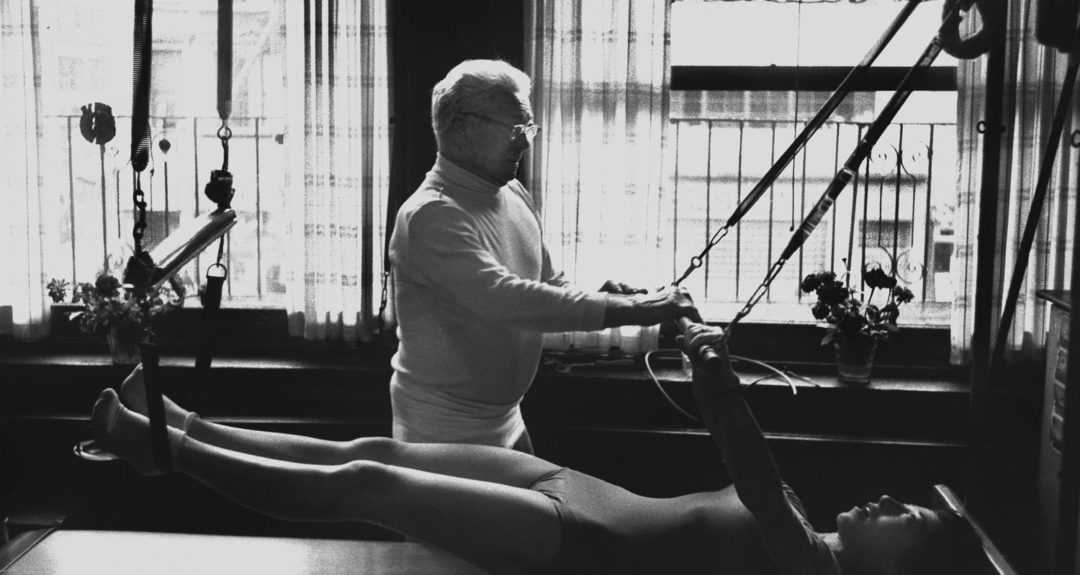In this blog Jonathan Grubb, APPI-qualified Pilates Instructor, writes about how Joseph Pilates originally created Pilates – and how his grandfather likely knew Joseph.
The background
After the beginning of World War 1, Joseph Pilates was interned as a prisoner of war by the British Government – along with all other men of German, Austrian, Italian and Turkish origin who were living in the UK at that time. Joseph was transported to Knockaloe Internment Camp on the Isle of Man in September 1915. The Isle of Man was neutral territory, so the British Government paid the government of the Isle of Man for the expenses incurred by internment.
Although the internees were cared for and relatively well fed for the time, the conditions were very basic and they did not have their freedom. They occupied themselves with activities such as gymnastics, boxing, gardening and carving sculptures from animal bone.
It has been said that being interned on the Isle of Man was perhaps safer for some than having to fight for either side of the War. However tuberculosis was still rife at that time and there was a disease known as ‘barbed wire disease’: now commonly known as depression.
The Camp contained 23,000 men and was surrounded by high barbed wire fencing. It covered an area of 22 acres, which is a fraction of a square mile. The Camp was divided into 4 sub-camps each containing more than 5000 men. The sub-camps each had their own hospital hut. Joseph was interned in Camp 4 where he also worked as a hospital orderly; the springs from the metal hospital beds initially inspired his early development of some of the larger Pilates equipment.
Connections to Joseph
During my research into Joseph Pilates’ internment, I discovered that my own great grandfather who was also of German origin, was interned in Camp 4 at the same time as Joseph. So it’s likely he would have known Joseph during the years spent there in a very close confinement.
Lolita San Miguel, who is the only living Pilates teacher to have been certified by Joseph Pilates, told me that she remembers asking Joseph about his time on the Isle of Man – he responded that it was a very important time for him as it gave him time and opportunity to work on his exercise method and to experiment with the method on different body types and on people with different injuries or restrictions.
Inspired by cats(!)
A 1962 edition of Sports Illustrated magazine contained an interview with Joseph in which he stated that the full principles of Contrology (Joseph’s name for the exercise method now known as Pilates) were revealed to him during WW1. During his internment, as weeks lengthened into months and years, Joseph watched his fellow prisoners sink into apathy and despair.
The article reports that Joseph observed cats which wandered into the Camp. Although they were nothing but skin and bones, they were lithe and springy and terribly efficient as they aimed for their prey. Why were the cats in such good shape, so bright eyed, while the humans were growing every day paler, weaker – apathetic creatures ready to give up if they caught a cold or fell down and sprained an ankle? Joseph observed that when the cats had nothing else to do they would stretch and stretch, keeping their muscles limber, alive.
He began working on an orderly series of exercises to stretch out all of the human muscles. Ultimately this series of exercises has become known as the 34 original Pilates mat exercises.
Pilates with APPI
My own Pilates journey started 5½ years ago when my wife was introduced to Pilates following an injury. Since then, our passion for Pilates has taken us to Greece and Germany many times, Barcelona, several APPI conferences and teacher training courses with MK Pilates and APPI.
Earlier this year I was delighted to qualify as an APPI Pilates matwork teacher and recently to assist Michael King in organising the MK Pilates conference on the Isle of Man where we were honoured to have APPI co-founder Elisa Withers as a guest presenter. The conference was held as a celebration of Pilates and marked both the opening of the Centre for WW1 Internment and 100 years since Joseph Pilates was released from the Camp.

